
Nobel Prize in Literature awarded to Abdulrazak Gurnah - a reading list
The 2021 Nobel Prize in Literature has been awarded to Tanzanian author Abdulrazak Gurnah. The Swedish Academy praises Gurnah's "uncompromising and compassionate penetration of the effects of colonialism and the fate of the refugee in the gulf between cultures and continents". The works in the reading list below are held in the collections of the African Studies Centre Leiden, and are available for loan through the Leiden University Libraries (UBL) catalogue.
Gurnah was born in Zanzibar in 1948 and left for Great Britain as a student at the age of 20. He obtained his PhD from the University of Kent in 1982, where he has since worked as a researcher and lecturer, with a particular focus on postcolonial literature by writers such as V.S. Naipaul, Salman Rushdie, Jamaica Kincaid and Zoe Wicomb. He is the author of ten novels, the most famous of which are Paradise (1994) and By the Sea (2001). He also compiled two collections of essays entitled Essays on African Writing. Two of his novels were translated into Dutch: in 1989 Arachne published Herinneringen aan mijn zwarte rotjeugd and in 1994, with Van Gennep, Paradijs.
His most recent novel is Afterlives (2020), in which colonialism, violence and war are again important themes.
Gurnah is the first African author of colour to win the Nobel Prize since Wole Soyinka in 1986.
To borrow a book, follow the link under the title or search our Catalogue.
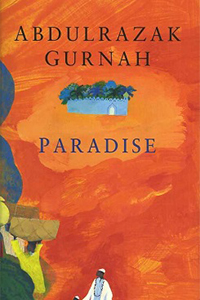
Paradise
1994
Gurnah's best-known novel is without a doubt Paradise, which was published in 1994 and brought him to a wider audience. Paradise was shortlisted for the Booker Prize in 1994. The novel focuses on Yusuf. When he is twelve years old, his father sells him to a wealthy businessman to pay off a debt. As a result, Yusuf leaves the simple, rural life in the countryside and ends up in precolonial urban life in East Africa. Anders Olsson, chair of the Nobel Prize Committee, stated that Paradise “contains clear references to Joseph Conrad for portraying the journey of the young and innocent Yusuf into the heart of darkness.”
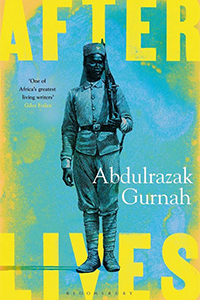
Afterlives
2020
Published only in 2020, Gurnah’s latest book can be viewed as a sequel to Paradise. The historical novel explores life just before the First World War in German East Africa, in what is now known as Tanzania. It follows its characters during fifty years, while the region was subjected to German and later British colonial rule. The story chronologically picks up where Paradise finishes and Gurnah uses similar narrative techniques in Afterlife as he used in Paradise. Widely lauded for its historical accuracy and unrelenting honesty about the colonial past of East Africa, it is not an easy read. With complex characters and sometimes gruesome scenes, the material is fascinating to some and arduous to others.
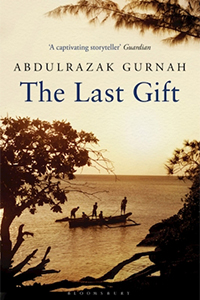
The Last Gift
2011
In The Last Gift, Abdulrazak Gurnah tells the story of Abbas, who, like Gurnah himself, moved from Zanzibar to the UK in his young years. After suffering a diabetic crisis, the now 63-years old Abbas becomes bedridden. As his two adult children return home and his wife takes care of him, Abbas realizes that he is no longer able to tell the story of his youth that he has always kept from his family. At the same time, his children struggle with similar issues as Abbas: they both feel being treated differently in England and both struggle with finding words for their past and present experiences. A chronicle of a family so turns into a story of migration to, and living in, the UK.
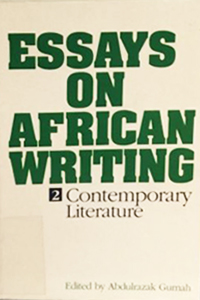
Essays on African Writing: 1: A Re-Evaluation & 2: Contemporary Literature
1994-1995
Besides writing his own work, Abdulrazak Gurnah has also edited two collections of essays on African literature. In his Essays on African Writing, he allows African writers and experts in the field of African or Caribbean literature to take the floor. Their contributions range from reviews of specific writers to discussions of entire poetic traditions. The first volume aims to reassess more celebrated African authors, while the second volume brings lesser-known writers to the fore. Gurnah wrote an introduction for both volumes.
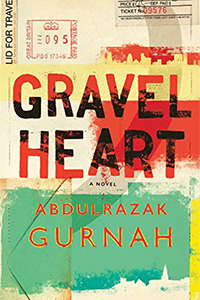
Gravel Heart
2017
Gravel Heart tells the story of Salim, who is raised in Zanzibar during its struggle for independence and subsequently travels to 1970s London. While hoping to escape Zanzibar and his complex and strained relations with his parents, Salim finds out the hard way that the only way to overcome childhood trauma is to face it – not run away from it. In Gravel Heart, Abdulrazak Gurnah connects the history of Zanzibar and London through the experiences of Salim, who moves between both worlds. The result is a fascinating and biting image of British postcolonialism.
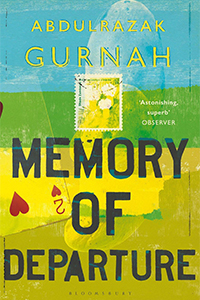
Memory of Departure
1987
In 1987 Gurnah made his debut with the novel Memory of Departure, about a failed uprising on the east coast of Africa. The family of the main character Hassan Omar falls prey to poverty and depravity after a revolt. The promises of freedom, independence and a better future are not fulfilled by the new rulers after the uprising. Fearing that talented young people will leave en masse, the new government actively pursues a policy of discouraging travel abroad. Eventually, Omar leaves for a wealthy uncle in Nairobi, where he lives a life of luxury until he discovers more about his uncle's past and his wealth, which is not entirely separate from the hypocritical and corrupt political system he so detests.
Contact your faculty liaison
Is a book missing on this list, or would you like UBL to purchase a book by or about Abdulrazak Gurnah that is not yet available in our collections? Contact your faculty liaison.
